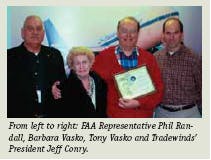November 21, 2006 marked a memorable day for Ground Support Worldwide contributor and 52-year industry veteran Tony Vasko as the Federal Aviation Administration (FAA) honored Tony with the Charles Taylor Master Mechanic Award.
To qualify for the award, an individual must have 50 years combined experience, civil or military service, in aviation maintenance as an accredited mechanic or repairman and be an FAA certified mechanic or repairman for at least 30 years.
"(The award means) quite a bit actually," Vasko says of his latest achievement. "It is more than just living long enough; Charles Taylor is a personal hero to me both due to his obvious skill in building an engine from scratch, literally, and to his honesty in denying, to the end of his life, that he had any role in the actual invention of the airplane outside of building the parts. He very modestly attributed the invention to the Wright Brothers. How many could resist the temptation to try to pick off a little of that glory?"
Taylor, recognized as the world's first airplane mechanic, is known for his work with the Wright brothers as well as his engine design and construction for the 1903 Wright Flyer. Named in his honor, the lifetime achievement award salutes senior mechanics.
Currently the manager of technical development for Tradewinds Airlines out of Triad International Airport in Greensboro, N.C., Tony started with the company in July of '97. He came in for a 'one and done' equipment review, but the company knew this rare talent was impossible to let go.
"It's a pretty phenomenal feat," asserts Tradewinds' President Jeff Conry. "It is 50 years of service in the industry and that shines a bit of light on what kind of value he brings to us." Conry counts his blessings for having a "father figure" like Tony around the office. "He knows the intricacies of the airline industry ... his silent leadership, guidance and input in this company has been instrumental in taking us from a one L-1011 to a fleet of four passenger L-1011s, the first airline to certify for A300-B4s and getting us into the 747 business. He's played an instrumental role."
Tony was awarded a certificate and pin for his achievement. Barbara Vasko, Tony's wife, received a pin for her contribution and support during his career. "[Barbara] stood by me through good and bad times and without her I wouldn't still be here," Vasko says. Tony's name will be added to the Role of Honor book at the Federal Aviation Building in Washington D.C.
"When it comes to anything involving aviation, you can talk to Tony," says Tradewinds' Director of QC Robbie Dexter. "He has good answers, good experience and he always has a good story to go with it."
Tony graduated from the Academy of Aeronautics in July 1954 and shortly thereafter received his Airframe and Powerplant license in August 1954. He first broke into the industry in September of the same year as a stock chaser at Idlewild Airport (JFK) for Lockheed Aircraft Service. Later that year, Tony became a mechanic and the rest is history.
In the July 1997 issue of GSE Today (now Ground Support Worldwide), former Editor George Prill launched "Ruminations from the Ramp" to give a little perspective to a youthful generation that may have missed the 'romance of aviation.' For nearly ten years Tony has been entertaining and educating the ground support industry with his stories from the 'good old days' when engines had cylinders and 'you had to walk uphill to get into the cockpit.' The Ground Support Worldwide staff eagerly anticipates ten more years with Tony.
An excerpt from the inaugural "Ruminations from the Ramp," July 1997:
"When Captain Eddie Rickenbacker was a pup and planes dragged their tails, passenger loading equipment consisted of a small roll-out ladder with three steps. Protection from the weather was provided by a heavy-weight umbrella. Eastern Airlines had a Standard Practice Manual which carefully defined the number of umbrellas allocated to each station. It was always fun watching the umbrella-toting passengers fighting their way across a ramp against a 30-knot crosswind that was propelling a pouring rain."
As for the future, Tony plans to continue his work writing maintenance manuals and work procedure forms, but the idea of a book isn't too far off in the horizon. "I will continue to work as long as I still enjoy the challenge. It sure keeps the rust off the thinking parts. Someday I will sit down, go over my writings here and in other magazines and write a book. 52 years in the business so far have given me some looks at some of the great folks and characters that have gravitated to our industry."





